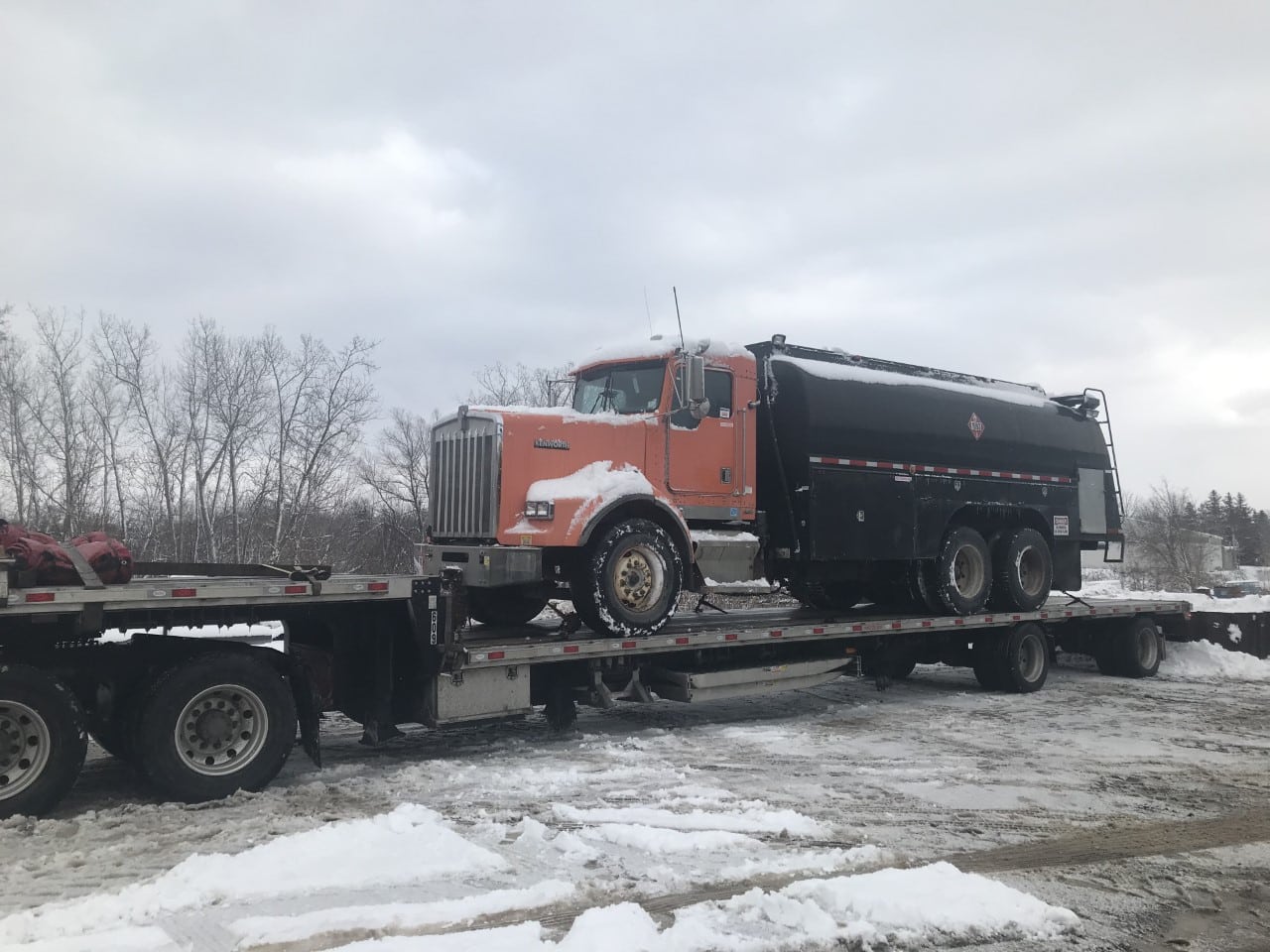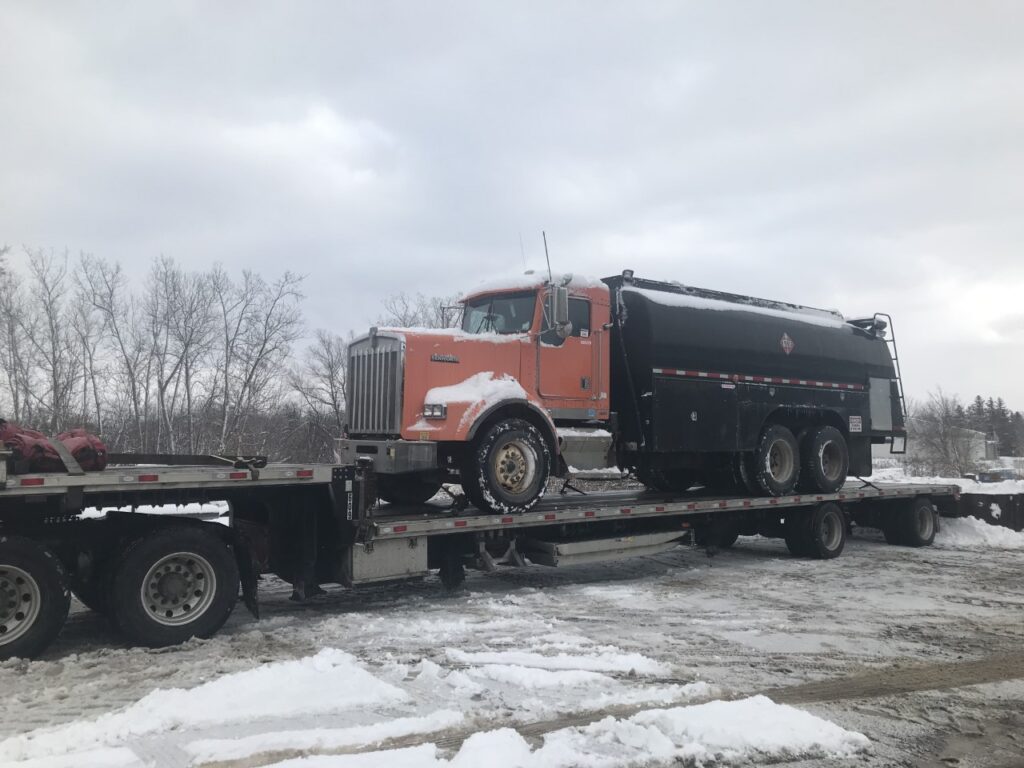
Trusted By All
50K+
Customers
65
Loads
22
Brokers
10+
Years of Experience
The Daily Bale
Natasha Post, Author
TractorTransport.com
As winter takes hold, there is often a lot of farm equipment that undergoes winter transport. Regardless of whether you’re moving farm machinery from its former worksite to an off-site equipment yard or another storage facility, not preparing your equipment sufficiently beforehand can lead to damage. In cold weather, snow piles or frozen internal fluids can reduce the performance of your vehicle.
If you know your farm equipment will be exposed to cold conditions, e.g., when it’s traveling on open-air transport to a new location, it’s critical to prepare your equipment carefully. Some equipment can be extremely temperature-sensitive, so it can also be necessary to store them in climate-controlled storage off-site. Keeping it under an awning, for example, may not be enough.
Routine Pre-Winter Checks for Farm Equipment Shipping
To avoid extensive preparations just before winter transport, it helps if your farm machinery undergoes routine inspections that target dirt, flaws, and receives on-the-spot maintenance. Immediately before and after cold weather, the following items need to be checked:
- Lights
- Brakes
- Windshield wipers
- Fluid levels
- Heater functionality
- Lubrication
- Joints and hinges
- Body wear and tear
- Glass and mirrors
One of the most critical series of checks involves all fluids and lubricants associated with your piece of equipment. Coolant, engine oil, fuel, transmission fluids, and drive fluids should all be checked ahead of colder weather coming in where possible. It may be necessary to switch to low-temperature grease and change the oil to a low viscosity one so it will perform better in the cold.
Typically, before transporting farm equipment, all fluids must be drained. Leaving approx. ¼ of the fuel in your farm equipment’s tank is acceptable, but you definitely shouldn’t allow your farm equipment to travel with almost a full tank.
Preparation Tips for Winter Farm Equipment Travel
Check the owner’s manual. Especially if your farm equipment will be packaged for transport, refer to the owner’s manual for the correct packaging techniques and materials suitable for securing your farm equipment for its winter tow. Pre-package any elements that they suggest should not be exposed during open-air travel. If you can’t find your manual, the manufacturer can often supply a replacement guide online.
Disconnect batteries. While there is often no regulatory requirement to disconnect this before winter transport, it’s considered best practice in many cases. On the subject of disconnects, it’s recommended that any alarm systems are disconnected before a winter journey as well. Where possible, once your farm equipment reaches its destination, store the battery or whole machine indoors, or make sure there’s a battery heater nearby for when it comes time to bringing the equipment up to operating temperature and putting it to work.
Secure loose components. Anything that can be removed often should be. For instance, if you’re shipping a tractor with an attachment, it’s usually safer to unhitch the attachment and transport it as a separate piece. Any loose ropes, straps, blades, and other components that could cause a lot of damage if they shake loose during high winds should be secure. Locking machinery doors and taping them shut can also prevent accidental door openings in transit and also avoids rain getting inside the cab.
Prepare permits well in advance. It won’t always be necessary to prepare and submit permit applications yourself; sometimes, the transporter will include this in the service. Confirm this is all in hand before your farm equipment leaves its origin point.
Make sure there’s plenty of room on-site for pickup and dropoff. You can easily lessen some of the risks associated with loading and unloading your farm equipment by preparing a large enough loading area for your winter farm equipment. Make sure there’s enough space for the and any loading equipment necessary; your transport company should be able to advise on the specifics.
Top Tips for Cleaning Winter Farm Equipment Before Transport
- Not only does clean equipment last longer, but it makes loading, securing, and unloading much more efficient. When your equipment is clean, tie-down points can be quickly located. Particularly for self-propelled machinery, having clean tires will make it safer to drive the equipment on and off a prepared trailer.
- Hot water pressure washers are great at removing dust, dirt, and general grime from your machinery. Steam-capable pressure washers are even quicker at cleaning up winter farm equipment. Ideally, pressure wash your farm equipment on an unpaved surface so that runoff can be filtered through the soil and reused as groundwater.
Shipping farm equipment through harsh winter weather conditions needs to be done with safety and care. Tractor Transport ships all farm equipment, including tractors, combines, miscellaneous heavy machinery and more, in winter months with every precaution. We’re here to make sure that your farm equipment is delivered safely and on time year round.

